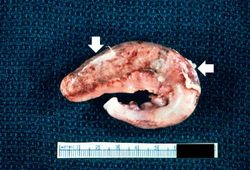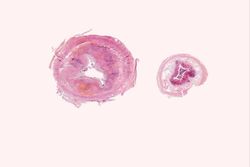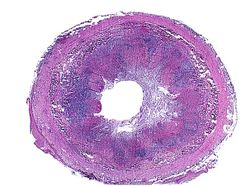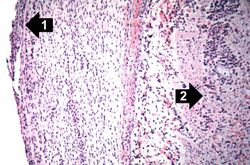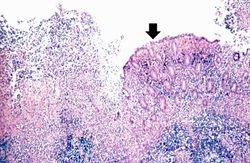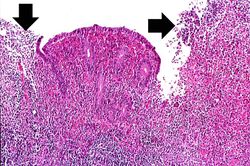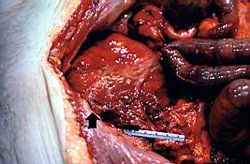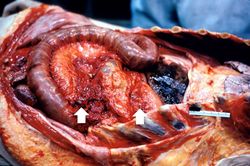Difference between revisions of "IPLab:Lab 3:Acute Appendicitis"
Seung Park (talk | contribs) (→Images) |
Seung Park (talk | contribs) |
||
| Line 16: | Line 16: | ||
File:IPLab3AcuteAppendicitis8.jpg|This is a gross photograph of another example of peritonitis. Again note the fibrinosuppurative exudate covering the abdominal organs (arrows). | File:IPLab3AcuteAppendicitis8.jpg|This is a gross photograph of another example of peritonitis. Again note the fibrinosuppurative exudate covering the abdominal organs (arrows). | ||
</gallery> | </gallery> | ||
| + | |||
| + | == Virtual Microscopy == | ||
| + | <peir-vm>IPLab3AcuteAppendicitis</peir-vm> | ||
== Study Questions == | == Study Questions == | ||
Revision as of 16:04, 3 January 2014
Contents
Clinical Summary[edit]
This 11-year-old male was admitted to the hospital with a complaint of 8 hours of severe pain in the right lower quadrant of the abdomen accompanied by nausea, vomiting, and diarrhea. Additional features on admission included a temperature of 101° F and a leukocytosis of 21,200 cells/mm³ with a shift to the left. An exploratory laparotomy revealed an inflamed appendix, retrocecal in location, which was adherent to the wall of the colon.
Autopsy Findings[edit]
The serosal surface of the appendix was covered with friable granular material. The lumen was dilated and contained a purulent exudate as well as a fecalith. The wall measured up to 0.4 cm in thickness.
Images[edit]
This is a low-power photomicrograph of a normal appendix on the right and an appendix with acute inflammatory response on the left. Note the abundant blue-stained lymphoid tissue beneath the mucosal layer and the absence of blue-staining cells in the submucosal layer of the normal appendix. Compare this with the extensive distribution of cells throughout the wall of the appendix with acute appendicitis. The blue color is due to the presence of many inflammatory cells, although at this low power these individual cells cannot be specifically identified.
This is a photomicrograph of an appendix exhibiting acute inflammation. Note that there are only remnants of mucosal tissue identifiable along the luminal border of this specimen. There is an extensive infiltration of leukocytes in this tissue which cannot be specifically identified at this low power. Note that the surface is very roughened and has deposits of fibrin.
This is a gross photograph of the open abdominal cavity of a patient with acute appendicitis. In this patient, there had been rupture of the appendix with spillage of intestinal contents into the abdominal cavity. This spillage resulted in an acute abdomen with widespread inflammation throughout the abdominal cavity. Note the roughened surface of the mesenteric tissue (arrow) due to deposition of fibrin over much of the surface.
Virtual Microscopy[edit]
Study Questions[edit]
Additional Resources[edit]
Reference[edit]
- eMedicine Medical Library: Appendicitis
- Merck Manual: Introduction to Acute Abdomen and Surgical Gastroenterology
- Merck Manual: Appendicitis
Journal Articles[edit]
- Helmer KS, Robinson EK, Lally KP, Vasquez JC, Kwong KL, Liu TH, Mercer DW. Standardized patient care guidelines reduce infectious morbidity in appendectomy patients. Am J Surg 2002 Jun;183(6):608-13.
Images[edit]
A normal white blood cell count is 4,000 to 11,000 cells per cubic mm.
A shift to the left indicates an increased ratio of immature PMNs (bands) to mature PMNs (segs).
Friable material is easily crumbled.
A fecalith is a hardened collection of fecal matter formed within the intestine.
An infiltrate is an accumulation of cells in the lung parenchyma--this is a sign of pneumonia.
